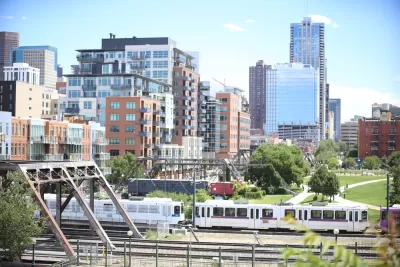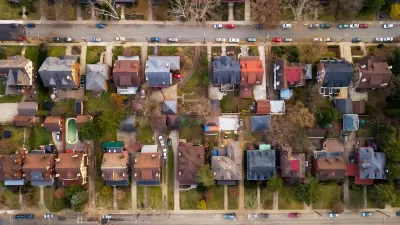A proposal to reduce parking requirements near transit and encourage higher-density affordable housing development received Planning Board approval, but community concerns about affordability and displacement remain.

"The Denver Planning Board voted 8-0 on Wednesday to forward the 'Expanding Housing Affordability' policy to the City Council and recommend that the council adopt it," but as Joe Rubino reports, the plan remains hotly debated.
The plan has faced criticism for reducing parking requirements for new developments in "transit-rich areas," prompting the city to narrow down eligibility to projects within a quarter mile of a transit stop. "All projects that meet the affordable housing requirements remain eligible for smaller reductions in the number of parking spaces they have to provide on-site, but the full exemption is now much more limited."
Other opponents worry that the proposal, which only applies to buildings with 10 or more units, doesn't go far enough to address affordability issues in parts of the city not zoned for larger multifamily buildings. "Instead, it will concentrate the affordable units in neighborhoods already under intense development pressure unless the city changes its zoning code to open up more neighborhoods for higher-density housing," critics say.
Two members of the advisory committee that helped develop the plan, Ean Tafoya of the Colorado Latino Forum and Nola Miguel of the Globeville, Elyria-Swansea Coalition Organizing for Health and Housing Justice, oppose it on the grounds that the policy's "affordability requirements don’t go deep enough to be attainable to people living in neighborhoods vulnerable to economic displacement like Globeville and Elyria-Swansea, and that there isn’t a strong mechanism to compel developers to build multi-bedroom units that could house families."
FULL STORY: Denver’s proposed affordable housing mandate advances despite concerns over equity, parking requirements

Alabama: Trump Terminates Settlements for Black Communities Harmed By Raw Sewage
Trump deemed the landmark civil rights agreement “illegal DEI and environmental justice policy.”

Planetizen Federal Action Tracker
A weekly monitor of how Trump’s orders and actions are impacting planners and planning in America.

The 120 Year Old Tiny Home Villages That Sheltered San Francisco’s Earthquake Refugees
More than a century ago, San Francisco mobilized to house thousands of residents displaced by the 1906 earthquake. Could their strategy offer a model for the present?

Ken Jennings Launches Transit Web Series
The Jeopardy champ wants you to ride public transit.

BLM To Rescind Public Lands Rule
The change will downgrade conservation, once again putting federal land at risk for mining and other extractive uses.

Indy Neighborhood Group Builds Temporary Multi-Use Path
Community members, aided in part by funding from the city, repurposed a vehicle lane to create a protected bike and pedestrian path for the summer season.
Urban Design for Planners 1: Software Tools
This six-course series explores essential urban design concepts using open source software and equips planners with the tools they need to participate fully in the urban design process.
Planning for Universal Design
Learn the tools for implementing Universal Design in planning regulations.
Clanton & Associates, Inc.
Jessamine County Fiscal Court
Institute for Housing and Urban Development Studies (IHS)
City of Grandview
Harvard GSD Executive Education
Toledo-Lucas County Plan Commissions
Salt Lake City
NYU Wagner Graduate School of Public Service





























